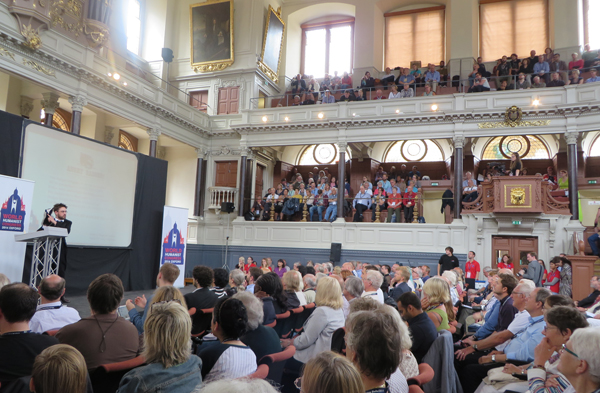(RNS) Atheists, humanists and liberals are now the targets of hate campaigns, according to a new Freedom of Thought Report, which found that some countries find the idea of atheism as a popular movement a threat to the prevailing order.

The World Humanist Congress meets in Oxford, U.K., on Aug. 10, 2014. Religion News Service photo by Brian Pellot
The report by the International Humanist and Ethical Union demonstrates a shift away from viewing atheists, humanists and secular liberals as merely apostates.
For example: Saudi Arabia is no friend of human rights and punishes apostasy with death (or, more often, enforced recantation and Quranic learning). But in January, Saudi Arabia enacted a new law equating “atheism” in itself with “terrorism.”
Another example: In May, Malaysian Prime Minister Najib Razak branded humanism and secularism, as well as liberalism, as “deviant.” To Najib, this combined secular worldview is a kind of “new religion.”
And in a more widely reported story in June, Egyptian authorities proposed an organized campaign against atheists. Nuamat Sati of the Ministry of Youth announced a program to spread awareness of “the dangers of atheism” and why it is “a threat to society,” so that young atheists in particular, who are increasingly vocal on social media, would be given “a chance to reconsider their decisions and go back to their religion.” Since then, several prominent atheists — young people finding their voice on YouTube and social media — have been harassed and arrested.
To some readers, maybe this won’t sound very controversial. But imagine the developments above, applied to other groups: The Jews are “deviant.” The Muslims are a kind of “new religion” that will bring down the state. Or, Christian thought is a form of “terrorism.”
This language is all too familiar. It goes far beyond merely dissenting or disagreeing with a point of view. It is, as we would readily recognize with other groups, intolerant — the stuff on which mass hatred and tragedy are made.
As editor of the report, I believe there are three important things that must now happen:
- The international community must accept freedom of thought and conscience. The theist’s right to theism is the very same right as the atheist’s right to atheism. As a moral right it derives from our shared human nature; as a legal convention it is written in the international framework, known as Article 18 of the Universal Declaration of Human Rights.
- Those who really don’t like atheism must accept that it isn’t going to go away. Studies vary widely in their estimates of irreligiosity, but the vast majority of research does show that atheists are a real and growing global minority. As access to comparative religious and wider philosophical ideas becomes available through our globalizing culture, the old geo-religious blocs are breaking down and atheism is sprouting up in the cracks.
- Atheists and humanists should not be afraid of recognizing they are a persecuted minority. This language does not come easily. For some it may just sound ridiculous, because it’s such an unreality in the lives of relatively comfortable, secular, liberal countries. For other atheists, the idea of being a group is antithetical. Many came to atheism as individuals and may have left religion in part because of what we saw as the perils of groupthink. Nevertheless, we are a group in the eyes of intolerant societies. We must recognize this, even embrace it. We must show solidarity to people living in parts of the world where advocating humanism or even lobbying for secularism or liberalism can be dangerous.
As we said in the report, this trend toward identifying atheists as a target minority is obviously negative, but it may also reflect a positive movement. If 2014 has seen something of a surge in hate directed at atheists, it is at least a backlash against a steadily globalizing conception of nonreligious identities.
Those of us with a secular worldview are coming together online, talking, in some countries meeting in secret. The nonreligious are raising their heads above the parapet. The backlash is a response to a surge of new ideas and new connections, and we can hold onto that.
(Bob Churchill is communications director for the International Humanist and Ethical Union and edited its Freedom of Thought Report.)
YS/MG END CHURCHILL




